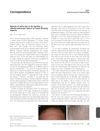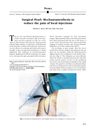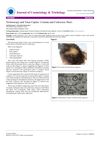 157 citations,
April 1994 in “Clinical endocrinology”
157 citations,
April 1994 in “Clinical endocrinology” Androgens can cause hair growth in some areas and hair loss on the scalp.
 1 citations,
July 2024 in “Skin Research and Technology”
1 citations,
July 2024 in “Skin Research and Technology” Patients with androgenetic alopecia have thinner subcutaneous fat layers in their frontal scalp compared to healthy individuals.
 90 citations,
February 2013 in “The Journal of Clinical Endocrinology and Metabolism”
90 citations,
February 2013 in “The Journal of Clinical Endocrinology and Metabolism” Women with PCOS have more body fat and thicker fat layers in certain abdominal areas than women without PCOS.
 16 citations,
August 2015 in “Journal of Experimental & Clinical Cancer Research”
16 citations,
August 2015 in “Journal of Experimental & Clinical Cancer Research” The photolyase-based device significantly changed the size and heat of potential skin cancer areas in patients.
 2 citations,
June 2019 in “Operative Techniques in Otolaryngology-Head and Neck Surgery”
2 citations,
June 2019 in “Operative Techniques in Otolaryngology-Head and Neck Surgery” The pedicled temporoparietal fascial flap is a reliable and versatile option for reconstructive surgery in the head and neck area.
 19 citations,
August 2011 in “Facial Plastic Surgery Clinics of North America”
19 citations,
August 2011 in “Facial Plastic Surgery Clinics of North America” Hair grafting is a key method for improving scars, especially in areas with hair, by transplanting hair to hide the scar while maintaining its original characteristics.
 1 citations,
December 2012 in “Journal of Dermatological Treatment”
1 citations,
December 2012 in “Journal of Dermatological Treatment” Injecting triamcinolone acetonide near surgical cuts doesn't greatly affect wound healing but may help in areas with less tension.
 September 2016 in “Más dermatología”
September 2016 in “Más dermatología” New factors in female hair loss include genetics, hormones, stress, and inflammation; future treatments should also focus on these areas and consider the patient's emotional well-being.
 48 citations,
February 2017 in “Journal of Cosmetic Dermatology”
48 citations,
February 2017 in “Journal of Cosmetic Dermatology” The conclusion is to use scalp cooling, gentle hair care, and treatments like minoxidil for managing hair loss from chemotherapy, and stresses the need for more research and collaboration in this area.
 23 citations,
April 2018 in “Journal der Deutschen Dermatologischen Gesellschaft”
23 citations,
April 2018 in “Journal der Deutschen Dermatologischen Gesellschaft” Permanent hair loss from cicatricial alopecia is treated by reducing inflammation and managing symptoms, but regrowth in scarred areas is unlikely.
 20 citations,
January 2014 in “Journal of skin cancer”
20 citations,
January 2014 in “Journal of skin cancer” Most people with basal cell carcinoma on their head or neck were 60-70 years old, and it often came back even after being fully removed, especially in certain areas and types.
 10 citations,
January 2009 in “Elsevier eBooks”
10 citations,
January 2009 in “Elsevier eBooks” Hair growth is influenced by hormones and goes through different phases; androgens can both promote and inhibit hair growth depending on the body area.
 21 citations,
September 1979 in “Archives of Otolaryngology-head & Neck Surgery”
21 citations,
September 1979 in “Archives of Otolaryngology-head & Neck Surgery” The Juri flap procedure is effective for hair transplantation but requires careful patient selection and skilled surgeons.
 33 citations,
August 2013 in “British Journal of Dermatology”
33 citations,
August 2013 in “British Journal of Dermatology” Lack of small, fine hair on the front hairline is a key sign of frontal fibrosing alopecia.
 9 citations,
June 2014 in “Journal of Craniofacial Surgery”
9 citations,
June 2014 in “Journal of Craniofacial Surgery” The method for sideburn reconstruction was safe and effective, giving natural-looking hair with minimal scarring.
 5 citations,
September 2011 in “Pediatric Dermatology”
5 citations,
September 2011 in “Pediatric Dermatology” Two young siblings experienced hair loss without hormone issues or other skin problems.
 1 citations,
July 2018 in “Elsevier eBooks”
1 citations,
July 2018 in “Elsevier eBooks” Triple horizontal scalp biopsies are 98% accurate in diagnosing hair loss, better than single biopsies.
September 2013 in “Canadian Medical Association Journal” Alopecia areata causes sudden hair loss, often resolves within a year, but can recur.
 29 citations,
September 1989 in “Journal of The American Academy of Dermatology”
29 citations,
September 1989 in “Journal of The American Academy of Dermatology” Abnormal scalp whorls can indicate brain development issues but may also be seen in neurologically normal people.
 19 citations,
May 2013 in “Annals of Oncology”
19 citations,
May 2013 in “Annals of Oncology” Aromatase inhibitors cause male pattern hair loss in women.
 13 citations,
April 2001 in “Journal of The American Academy of Dermatology”
13 citations,
April 2001 in “Journal of The American Academy of Dermatology” Using a vibrating device during injections can help reduce pain.
 9 citations,
August 2018 in “JAAD Case Reports”
9 citations,
August 2018 in “JAAD Case Reports” Tofacitinib can temporarily improve hair growth in alopecia universalis, but its effectiveness may decrease over time.
 8 citations,
January 2015 in “International journal of trichology”
8 citations,
January 2015 in “International journal of trichology” A woman's total hair loss was linked to a Borrelia infection and was reversed with appropriate treatment.
 6 citations,
May 1993 in “Archives of Disease in Childhood”
6 citations,
May 1993 in “Archives of Disease in Childhood” Children's hair loss can be caused by many factors, including autoimmune diseases, emotional stress, genetics, and infections, with treatment and prognosis varying.
 2 citations,
May 2005 in “Seminars in Plastic Surgery”
2 citations,
May 2005 in “Seminars in Plastic Surgery” The Juri Temporo-Parieto-Occipital Flap is a good option for scalp reconstruction and hairline restoration with a natural look, despite some risk of necrosis and scarring.
 1 citations,
January 2016 in “Journal of cosmetology & trichology”
1 citations,
January 2016 in “Journal of cosmetology & trichology” Trichoscopy helped diagnose and treat a child's fungal scalp infection by spotting specific hair shapes.
 July 2018 in “Hair transplant forum international”
July 2018 in “Hair transplant forum international” To prevent thinning in the donor area, harvest less than 50% of the original hair density in repeat hair transplants.
 November 2017 in “Pediatrics in Review”
November 2017 in “Pediatrics in Review” A 4-year-old girl with hair loss was diagnosed with early-onset trichotillomania and improved with behavioral interventions.
 222 citations,
January 2014 in “International journal of reproductive medicine”
222 citations,
January 2014 in “International journal of reproductive medicine” Insulin resistance and obesity are key factors in the development and worsening of polycystic ovary syndrome, and lifestyle changes are important for managing it.
 129 citations,
January 2009 in “International Journal of Trichology”
129 citations,
January 2009 in “International Journal of Trichology” Trichoscopy can diagnose female hair loss with high accuracy by looking for specific patterns in hair and scalp appearance.





























